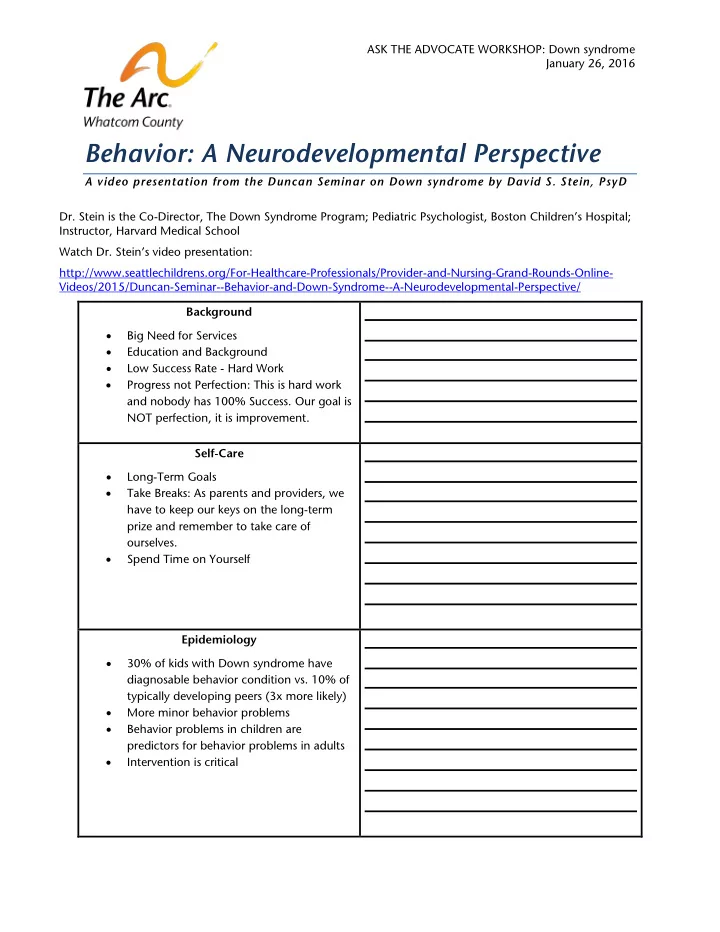

ASK THE ADVOCATE WORKSHOP: Down syndrome January 26, 2016 Behavior: A Neurodevelopmental Perspective A video presentation from the Duncan Seminar on Down syndrome by David S. Stein, PsyD Dr. Stein is the Co-Director, The Down Syndrome Program; Pediatric Psychologist, Boston Children’s Hospital; Instructor, Harvard Medical School Watch Dr. Stein’s video presentation: http://www.seattlechildrens.org/For-Healthcare-Professionals/Provider-and-Nursing-Grand-Rounds-Online- Videos/2015/Duncan-Seminar--Behavior-and-Down-Syndrome--A-Neurodevelopmental-Perspective/ Background • Big Need for Services • Education and Background • Low Success Rate - Hard Work • Progress not Perfection: This is hard work and nobody has 100% Success. Our goal is NOT perfection, it is improvement. Self-Care • Long-Term Goals • Take Breaks: As parents and providers, we have to keep our keys on the long-term prize and remember to take care of ourselves. • Spend Time on Yourself Epidemiology • 30% of kids with Down syndrome have diagnosable behavior condition vs. 10% of typically developing peers (3x more likely) • More minor behavior problems • Behavior problems in children are predictors for behavior problems in adults • Intervention is critical
ASK THE ADVOCATE WORKSHOP: Down syndrome January 26, 2016 Behavior: A Neurodevelopmental Perspective A video presentation from the Duncan Seminar on Down syndrome by David S. Stein, PsyD Etiology: Why do children with Ds have behavior problems? • Brain Differences Reduced Growth in Frontal Lobe o Smaller Brain Stem & Cerebellum o Problems in Temporal Lobe & o Hippocampus Brain Differences Consequences of Brain Differences in Ds • Social Hyper-aware & hyper-engaged o Hyper-aware can also mean o hypersensitive • Language Receptive vs. Expressive o Resulting Frustration o • Information Processing & Memory Strong Visual Learning o Storing and Understanding o Information The world has expectations about o understanding/comprehension = scary! • Motivation Lower Desire for Mastery o Gas in the Tank model o Great frustration can lead to avoidance o • Executive Functioning Impulsivity: may not see the stop signs o May struggle with planning behavior o and considering consequences Big Picture • Complex world = Perfect Storm for Frustration and Behavior If not well supported and understood o
ASK THE ADVOCATE WORKSHOP: Down syndrome January 26, 2016 Behavior: A Neurodevelopmental Perspective A video presentation from the Duncan Seminar on Down syndrome by David S. Stein, PsyD What can we do about behavior problems? Relationship is key: When you don’t know what to do, consider what is best for your relationship Behavior Basics • Reinforce what you want to see more • Don’t reinforce what you want to go away. Reinforcing Good Behavior • Use Attention • Notice Good Behavior and React • Praise Good Behavior • Simple Token Economy Visuals, Repetition, Motivators, o Attention for Positive Behavior Functions of Behavior Purpose • ABCs of Behavior Antecedent: What’s the situation? o Behavior: What are they doing? o Consequences: What happens o afterwards? • 2 Most Common Functions are Attention and Avoidance/Escape Lower Intrinsic Motivation = Escape o Hyper-Social + Reduced Impulse o Control = Attention Positive Behavior Support Strategies • Choices = control • Redirection Providing positive feedback o • Incentives or Providing the Carrot First ____, then _____ o • Boost motivation throughout the day
ASK THE ADVOCATE WORKSHOP: Down syndrome January 26, 2016 Behavior: A Neurodevelopmental Perspective A video presentation from the Duncan Seminar on Down syndrome by David S. Stein, PsyD Attention Seeking Example • What is the Situation? • What is the Function of this behavior? • What is reinforcing this behavior? • What could be done differently? Have you experienced a similar example? Planned Ignoring • 3 Basket Model Basket 1 is safety concerns, something o must change Basket 2 is frustrating for everyone, o something should change Basket 3 is minor frustrations, o something could change, mostly ignore the behavior How do we remember these principles? • Mindfulness in stressful situations • Shut down your reactions • Reverting to old habits can be easy; remember reaction influence immediate and future path
ASK THE ADVOCATE WORKSHOP: Down syndrome January 26, 2016 Behavior: A Neurodevelopmental Perspective A video presentation from the Duncan Seminar on Down syndrome by David S. Stein, PsyD Environment Strengths and Weaknesses Visual vs. Verbal Social vs. Impulse Control Routine and predictability vs. inconsistency • Routines, especially visual, promote repetition and predictability Visual takes pressure off of relationship o • Visual Timers • Social Motivators • Social Stories What to do in a given situation o Negatives include wordiness, inconsistency, and responses to negative behavior Discipline • Positive Behavior Supports > Punishment • Positive strategies are more effective! • Discipline may be Reinforcing negative behavior • Reinforcement = adding • Discipline = taking things away Adjust Situation by Removing Reinforcers Vocal Communication (i.e. yelling) o Reasoning/language o Eye Contact o Facial Expression o “Social-Emotional Radar” o Respond but don’t react • Look at the Whole Picture (condition, environment, etc.) What can you remove? o • Seek Help when Needed • Is there another condition that needs treatment? • Is the environment causing problems?
ASK THE ADVOCATE WORKSHOP: Down syndrome January 26, 2016 Behavior: A Neurodevelopmental Perspective A video presentation from the Duncan Seminar on Down syndrome by David S. Stein, PsyD Support/Resources • Professionals • Schools • Community • Books Review/Closing Thoughts • Think about Situation from Child’s point of view • Focus on positives - and their strengths! • The goal is not perfection, it is improvement: Remember Where you Started “The “endpoint” is not tomorrow or next month. It is the individual with Ds having a fulfilling adulthood and not being limited by behavior problems.” Q&A • Extinction Burst • Ignoring and Siblings • Peer Modeling/Influence • Insurance Coverage • Toddlers • Dual Diagnosis
Recommend
More recommend